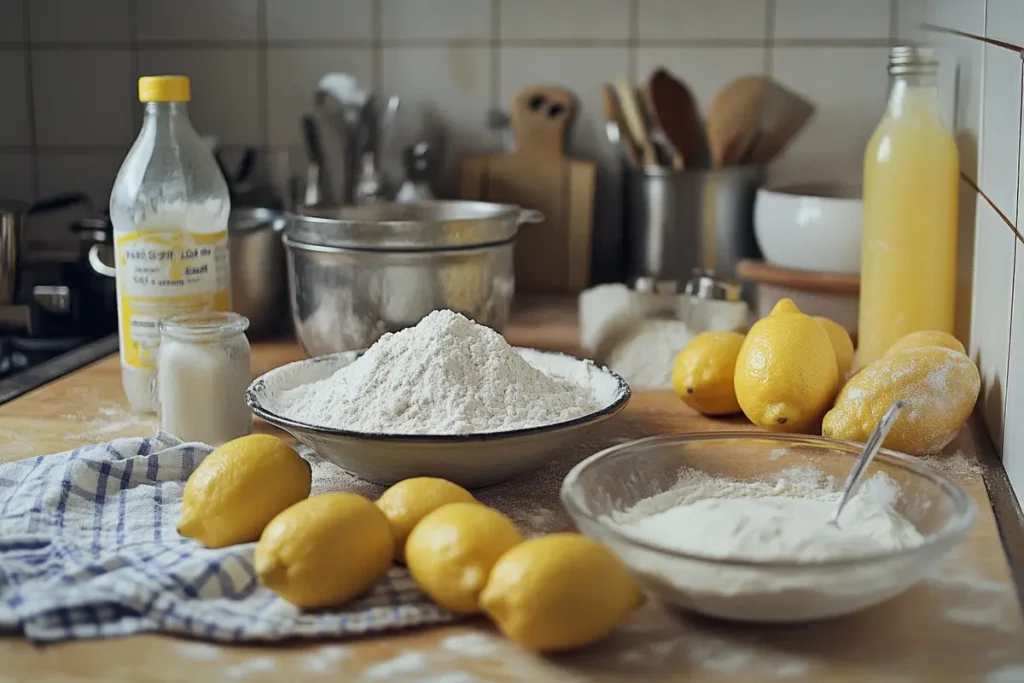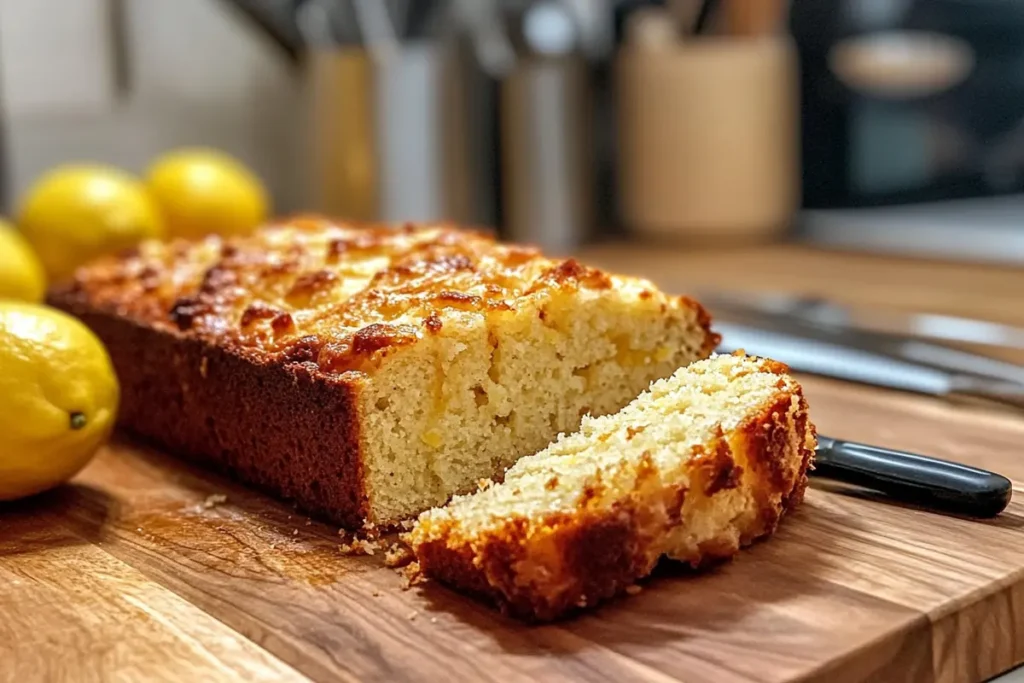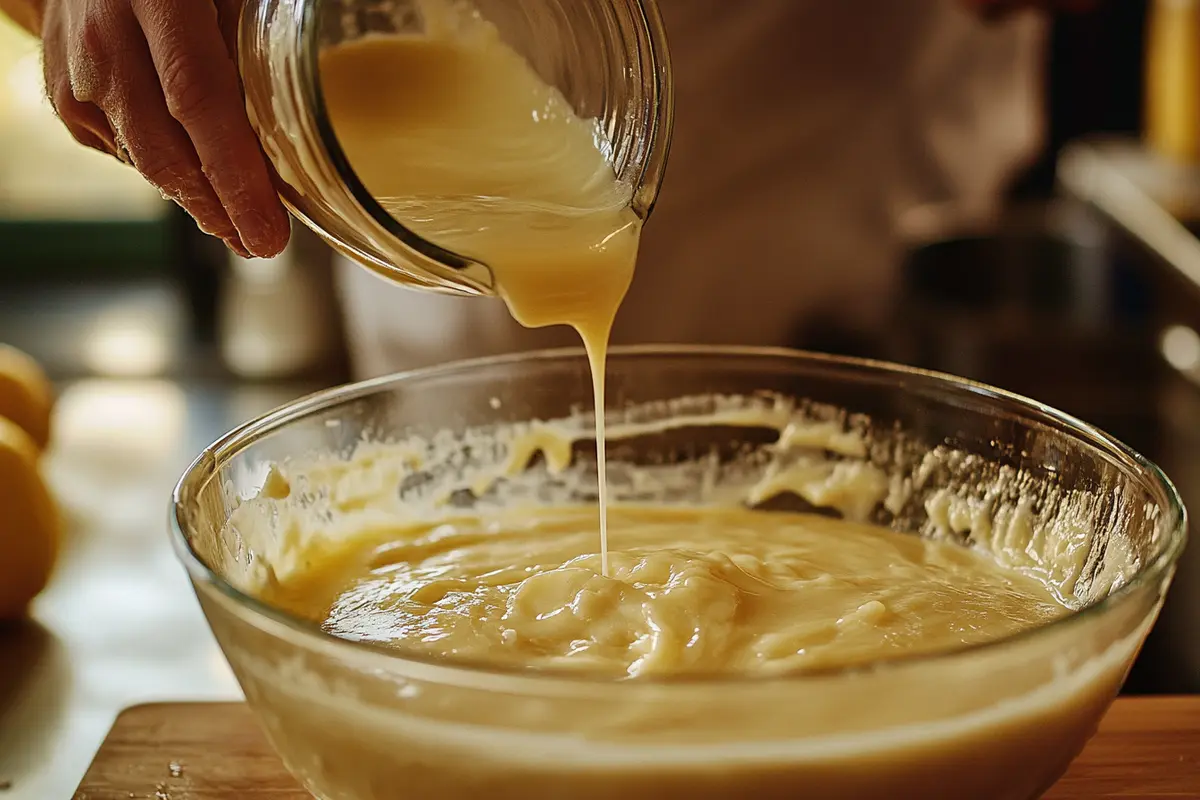Have you ever wondered what happens when you add lemon juice to cake batter? This small but impactful ingredient can transform your cake’s flavor, texture, and even its rise. Lemon juice doesn’t just bring its signature tanginess; it also has unique chemical properties that interact with other ingredients in fascinating ways. Whether you’re a home baker or just curious about the science of baking, this article will guide you through every detail of how lemon juice affects your cakes.
Let’s dive into the first part and uncover the foundations of baking with lemon juice.
Understanding the Impact of Lemon Juice in Cake Batter
The Role of Ingredients in Baking
Baking isn’t just about tossing a few ingredients into a bowl and hoping for the best—it’s an intricate balance of chemistry and creativity. Each ingredient plays a specific role. Flour provides structure, sugar adds sweetness, and leavening agents like baking soda and baking powder ensure your cakes rise. But what happens when you throw an acidic ingredient like lemon juice into the mix?
Acidic elements alter the pH levels in your batter, creating a ripple effect that impacts texture, flavor, and consistency. This makes lemon juice a game-changer when used correctly.
Introduction to Lemon Juice as a Baking Component
Lemon juice isn’t just a flavor enhancer—it’s a multifunctional ingredient in baking. Its high acidity and natural citric acid make it a versatile addition to cake recipes. While it’s a natural choice for citrus-flavored desserts, its potential stretches far beyond taste. But what happens when you add lemon juice to cake batter? It can adjust the texture, aid in leavening, and even act as a preservative to keep your cakes fresher for longer.
Whether you’re adding it to classic sponge cakes, pound cakes, or more experimental recipes, understanding what happens when you add lemon juice to cake batter can elevate your baking skills. From creating a light, airy crumb to delivering a zesty punch, the possibilities are endless.

Chemical Properties of Lemon Juice
Acidity Levels and pH
Lemon juice is renowned for its high acidity, with a pH level ranging between 2 and 3. This acidity is what gives it its sharp, tangy flavor. But in baking, the pH level has a deeper role—it alters the chemical balance of the cake batter. Acidity can impact the stability of proteins, fats, and starches, affecting how the cake turns out.
For example, a more acidic batter encourages better activation of leavening agents like baking soda. On the flip side, too much acidity can destabilize the batter, making it dense or gummy. This is why balancing the quantity of lemon juice with other ingredients is crucial.
Citric Acid Composition
At the heart of lemon juice’s tanginess lies citric acid. This organic acid not only defines the juice’s taste but also acts as a natural preservative. When added to cake batter, citric acid serves as a catalyst in chemical reactions. For example, it can boost the efficiency of leavening agents by releasing carbon dioxide more effectively, ensuring a well-risen cake.
Additionally, citric acid breaks down proteins and starches slightly, which contributes to a softer crumb texture. It’s amazing how such a simple ingredient can influence so much!
Interaction with Leavening Agents
Reaction with Baking Soda
Here’s where things get exciting: lemon juice and baking soda make a dynamic duo. Baking soda (sodium bicarbonate) is a base, and when combined with an acid like lemon juice, it creates a bubbly reaction. The reaction releases carbon dioxide gas, which gets trapped in the batter, causing it to expand.
This reaction is why cakes made with lemon juice often have a lighter, airier texture. However, timing matters—because the gas release happens quickly, you need to bake the batter promptly to capture all that lift!
Reaction with Baking Powder
Baking powder is essentially a mix of baking soda and a powdered acid, so it doesn’t require additional acidity to work. That said, adding lemon juice can enhance its effectiveness. The extra acidity speeds up the release of carbon dioxide, amplifying the leavening process.
However, too much acidity can neutralize the baking soda in the powder, reducing its effectiveness. Striking the right balance is key to achieving a well-risen, fluffy cake.
Effect on Gluten Development
Gluten Formation in Cake Batter
Gluten, formed from proteins in flour, gives structure to baked goods. When you mix flour with liquid, proteins like glutenin and gliadin bind to form gluten. This creates the stretchy network that traps air bubbles, giving cakes their shape.
In cakes, you generally want less gluten formation than in bread to ensure a tender crumb. Lemon juice plays a crucial role here by slightly weakening the gluten network, thanks to its acidic nature.
How Acidity Influences Gluten Structure
Acidity affects the protein bonds in gluten, making them less rigid. As a result, cakes with lemon juice tend to have a softer, more delicate texture. However, overdoing it with the acid can lead to a batter that’s too slack, causing the cake to lose structure and become overly dense.
When used in moderation, lemon juice strikes the perfect balance, ensuring your cake is tender without collapsing. Its interaction with gluten and other ingredients is what makes it a secret weapon in baking!
Effects of Adding Lemon Juice to Cake Batter
Flavor Enhancement
Balancing Sweetness and Tartness
One of the standout effects of adding lemon juice to cake batter is its ability to balance sweetness with a subtle tang. Cakes often lean toward sweetness due to sugar, but lemon juice introduces a sharp acidity that counteracts overly sugary flavors. This balance makes the cake taste more complex and refined, appealing to a broader palate.
If you’ve ever wondered what happens when you add lemon juice to cake batter, this is a prime example. The citrusy zing enhances desserts like lemon drizzle cake or lemon pound cake, complementing the rich, buttery sweetness. A little lemon juice goes a long way, preventing the cake from feeling cloying and leaving a fresh, zesty aftertaste.
For another tangy dessert, consider trying The Easiest Lemon Dump Cake Recipe Ever, which is a perfect example of how citrus flavors can elevate simple cakes to new heights.
Intensifying Citrus Notes
Beyond just balancing flavors, lemon juice intensifies citrus notes, giving the cake a brighter, more vibrant taste. Even in recipes where lemon isn’t the main flavor, such as vanilla or almond cakes, a splash of lemon juice can subtly enhance the overall flavor profile. This amplifying effect is due to the natural oils and compounds in lemons that activate the taste buds more effectively.
Whether you’re baking a full-on citrus cake or simply looking to add complexity, lemon juice adds that “pop” of flavor that leaves everyone asking for seconds.
Texture Modification
Achieving a Tender Crumb
Adding lemon juice to cake batter also affects the cake’s texture by creating a softer, more delicate crumb. The acid in lemon juice slightly inhibits gluten formation, as discussed earlier, which reduces the cake’s elasticity. This results in a tender, melt-in-your-mouth consistency—a hallmark of well-made cakes.
Furthermore, lemon juice’s interaction with fats and proteins in the batter ensures that the cake remains light without sacrificing its structural integrity. Bakers often rely on lemon juice to achieve this delicate balance.
Impact on Moisture Content
Lemon juice doesn’t just enhance flavor and texture; it also contributes to moisture retention in cakes. Its natural water content, combined with its acidic properties, helps prevent the cake from drying out during baking.
By lowering the batter’s pH, lemon juice locks in moisture and creates a slightly denser but pleasingly moist texture. This is especially useful in recipes that traditionally have a tendency to dry out, like sponge cakes or chiffon cakes.
Influence on Cake Rise and Density
Promoting a Light and Airy Structure
When it comes to cake rise, lemon juice acts as a secret weapon. Its acidity reacts with leavening agents like baking soda and baking powder, creating carbon dioxide gas bubbles. These bubbles expand in the oven, causing the batter to rise and giving the cake its fluffy, airy structure.
Additionally, because lemon juice enhances the effectiveness of these leavening agents, it can compensate for slight imbalances in your batter. This ensures consistent results, even if the rest of the recipe isn’t perfectly measured.
Risks of Over-Acidification
However, too much of a good thing can spell trouble. Overusing lemon juice can lead to over-acidification of the batter, disrupting the cake’s structure. Excess acid can neutralize the leavening agents before they have a chance to work effectively, resulting in a cake that’s dense and flat.
Moreover, over-acidified batters may also struggle to hold their moisture, leading to a gummy or overly wet texture. While lemon juice is a fantastic addition to cake recipes, balance is key to unlocking its full potential without unwanted side effects.

Optimal Quantities of Lemon Juice in Different Cake Types
Sponge Cakes
Sponge cakes, with their light and airy texture, thrive on balance. Adding lemon juice to sponge cake batter requires moderation—usually 1 to 2 teaspoons per cup of batter. This small amount enhances the cake’s flavor without overwhelming its delicate structure. Too much acidity can destabilize the batter, causing it to collapse during baking.
The result is a subtle citrus undertone that pairs beautifully with fillings like whipped cream or fruit preserves. Sponge cakes also benefit from the moisture retention properties of lemon juice, ensuring they remain soft even after a day or two.
Pound Cakes
Pound cakes are denser by nature, making them better equipped to handle more lemon juice. Recipes often call for 2 to 3 tablespoons of lemon juice, which helps cut through the richness of butter and sugar. The acidity not only balances the flavors but also keeps the cake moist and flavorful for longer.
Lemon pound cakes are a classic example of how lemon juice can transform a simple recipe into something extraordinary, with its zingy and buttery harmony.
Chiffon Cakes
Chiffon cakes, known for their pillowy softness, rely heavily on leavening agents. Here, lemon juice plays a dual role: enhancing flavor and improving rise. Use around 1 tablespoon of lemon juice per cup of batter to ensure a perfect texture. This amount complements the cake’s lightness while helping it retain structure.
Chiffon cakes are a great canvas for experimenting with lemon, as they embrace citrus flavors without losing their airy character.
Adjusting Other Ingredients When Adding Lemon Juice
Balancing Sugar Levels
Adding lemon juice to cake batter introduces acidity that needs to be counterbalanced with sweetness. For every tablespoon of lemon juice, increase the sugar by 1 to 2 teaspoons. This adjustment prevents the cake from becoming overly tart while still letting the citrus shine through.
For example, in a lemon pound cake, balancing sugar with the sharpness of lemon juice ensures a harmonious flavor profile that’s neither too sweet nor too tangy.
Modifying Leavening Agents
Because lemon juice interacts with leavening agents, it’s essential to fine-tune their quantities. If you’re using baking soda, reduce it slightly to avoid an overly vigorous reaction that might compromise the cake’s texture. Alternatively, for recipes with baking powder, consider lowering the amount by about 10% to maintain balance.
These adjustments ensure that the cake rises evenly and avoids the pitfalls of over-acidification, such as a gummy texture.
Altering Liquid Components
Lemon juice also contributes to the liquid content of your batter. To avoid overly thin batter, reduce other liquids (like milk or water) by the same amount of lemon juice added. For instance, if you’re adding 2 tablespoons of lemon juice, reduce milk or water by 2 tablespoons to maintain the correct consistency.
This simple tweak ensures the batter remains cohesive, leading to cakes that bake evenly without structural issues.
Common Mistakes to Avoid
Over-Acidification Leading to Dense Cakes
One of the most frequent errors when adding lemon juice to cake batter is using too much. Over-acidification can neutralize leavening agents, causing the cake to rise inadequately. The result? A dense, flat cake that lacks the airy texture you’re aiming for.
To prevent this, always measure lemon juice carefully and follow recipe guidelines. A teaspoon or tablespoon too much can dramatically alter the outcome.
Mistakes like these are common, but knowing What is the Biggest Mistake to Avoid When Making a Dump Cake? can help you troubleshoot similar issues in other recipes.
Insufficient Balancing of Flavors
Another common mistake is failing to adjust the sweetness when adding lemon juice. Without balancing the tartness, the cake may end up overly sour, masking other flavors. This can leave an unpleasant aftertaste that detracts from the overall experience.
To fix this, taste-test your batter (if safe to do so) and add small increments of sugar until the flavors feel well-balanced. It’s better to err on the side of subtlety—lemon should enhance, not dominate.
FAQs About Adding Lemon Juice to Cake Batter
Can I Substitute Lemon Juice with Other Citrus Juices?
Yes, juices like lime or orange can substitute lemon juice, but their acidity and sweetness differ. Lime juice is the closest alternative, while orange juice may require less sugar adjustment.
How Does Lemon Juice Affect Baking Time?
Lemon juice rarely impacts baking time significantly. However, its extra moisture may slightly extend the time. Always check for doneness with a toothpick.
Is Fresh Lemon Juice Better Than Bottled for Baking?
Fresh lemon juice is preferred for its pure flavor and higher acidity. Bottled juice often contains preservatives that may alter taste or texture.
Can Lemon Juice Be Used in Boxed Cake Mixes?
Absolutely! Adding lemon juice enhances flavor in boxed cake mixes. Use about 1–2 tablespoons per recipe for a zesty twist.
Does Lemon Juice Affect the Color of the Cake?
Yes, it can slightly lighten the cake’s color due to its bleaching effect on pigments in the batter, especially when combined with acidic dairy.
How Can I Enhance Lemon Flavor Without Altering Texture?
Boost flavor with lemon zest, which adds intense citrus notes without increasing acidity or liquid content. It’s a simple yet effective solution.
Conclusion
Key Takeaways for Bakers
Knowing what happens when you add lemon juice to cake batter is essential for elevating your baking. Lemon juice enhances flavor, softens texture, and helps cakes rise beautifully. But remember, moderation is crucial to avoid over-acidification and maintain the perfect balance in your batter.
Encouragement to Experiment with Citrus in Baking
Experimenting with lemon juice in cake batter can transform ordinary cakes into extraordinary ones. With its ability to harmonize flavors and improve texture, it’s a versatile addition every baker should try. So, why not explore what happens when you add lemon juice to cake batter in your next recipe? You might just discover your new favorite baking trick!

